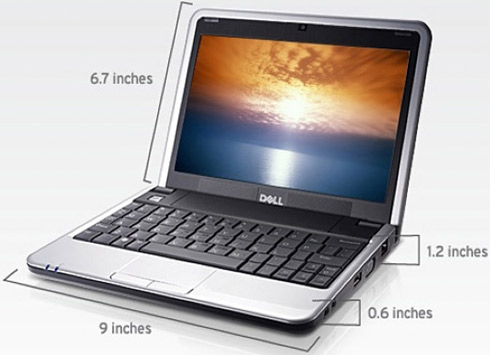What is a Netbook Computer?
Let’s start at the beginning. Based on current technology a Netbook computer is an ultraportable computer:- typically weighing 2.5 pounds
- having a screen size between 7” and 10”
- including a wireless networking adapter (g/n)
- having no internal optical (CD or DVD) drive
- typically running Windows XP Home
- utilizing a lower powered CPU such as the Intel Atom CPU.
The Net book computer has captured many people’s interest for two main reasons – size and price. Based on size and weight a Netbook fits somewhere in between the smartphone and the laptop computer. Key factors that differentiate a Netbook computer from other portable computers are:
Size — Most Netbook computers have a screen size between 7” and 10” measured diagonally. They are larger than a smartphone, which have screens not much bigger than 3” diagonally, and smaller than a laptop computer which range between 12” and 17”.
Price – Netbook computer prices range from $250 to $800 with an average price in the $350 range. This price can increase if you add an external CD/DVD drive
Weight – The other aspect of a Netbook computer being “smaller” is weight. Most Netbooks weigh in at around 2.5 pounds. A smaller screen means a lighter screen and a smaller and lighter battery to power the smaller screen. The weight of most Netbooks falls in the 2 – 3 pounds range however adding a larger, extended life battery can add as much as half a pound to the overall weight.
CPU or Computing Power – Most Net book computers use a CPU from the Intel Atom CPU line. These “brains” are less powerful than the Intel P4, Core, or Core 2 CPUs or the AMD CPUs that are in most laptop computers. While these CPUs provide less computing power they also require much less electrical power resulting in smaller, lighter weight batteries and cooler running Netbooks. UPDATE: Intel released its latest versions of the Atom CPU in early 2010.
Optical Storage (CD/DVD) – Internal CD or DVD drives are not included in a netbook computer. External drives can be connected through USB ports for loading software or transferring data to another computer. External optical drives are not included in the base cost of most Netbook computers.
Mass Storage (hard disk drive) – Netbooks offer either a traditional hard disk drive (HDD) that have a capacity between 60 GB and 160 GB, or lower capacity solid state drives (SSD) with capacities ranging from 16 GB to 64 GB of flash memory.

Potential Drawbacks with A Netbook Computer
Size, weight and price provide some real benefits with Netbook computers. There are also a number of trade-offs with the reduced size and weight.- Keyboard size — A Netbook computer’s keyboard is usually about 85 to 95 percent of a full-size QWERTY keyboard. The layout and arrangement of the keys can also vary. Netbooks that have 10-inch screens tend to offer the larger keyboards. Well worth a test drive to determine if the smaller keyboard is a good fit for you.
- Computing power – As explained earlier a Netbook computer is not designed for computing intensive tasks such as editing videos or large photos or playing modern video games. Loading programs and saving documents may also be a bit slower than a laptop.
- Expandability and Ports – Some netbook computer models may have only two USB ports and may lack a PC-Card slot.
- Limited hard disk storage – Some models offer only a 16GB or 32GB solid state drive. After the space required for Windows and your program files these smaller capacity drives may not leave sufficient space for all your other files in the long term. Especially if you are considering copying your 30GB music and photo library onto the computer.
- No internal optical drive – as noted above Netbook computers do not have internal CD or DVD drives by definition. It is relatively easy to connect an external drive via USB but it will cost extra.
- Battery life – These rating can vary significantly, ranging from 2.5 hours to over 8 hours depending on the model. Many netbook computer manufacturers also offer an extended life battery as an extra cost option.
- RAM – Most Netbooks come with 1GB of RAM and can accept a maximum of 2GB. The higher amount will provide better performance but is an added cost.
- Mouse buttons and touchpad – The smaller amount of keyboard real estate can also impact the mouse buttons and the touchpad. As with laptops the configuration of these important elements can vary. Another area where a test drive will be beneficial.
For many people the main decision point between a Netbook computer and a laptop will be size and weight. If you are looking for a very small footprint, very lightweight basic computing device you should seriously consider one these. If you will need more computing power (bigger applications or having many applications open at once), an internal CD/DVD drive, a big, fast hard disk drive, or lots of ports, the laptop will probably be the better option.



0 comments:
Post a Comment